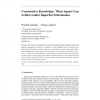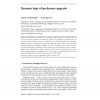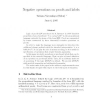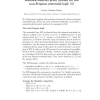113
click to vote
JANCL
2007
15 years 2 months ago
2007
We propose a non-standard interpretation of Alternating-time Temporal Logic with imperfect information, for which no commonly accepted semantics has been proposed yet. Rather than ...
125
click to vote
JANCL
2007
15 years 2 months ago
2007
ABSTRACT. Statements not only update our current knowledge, but also have other dynamic effects. In particular, suggestions or commands ‘upgrade’ our preferences by changing th...
107
click to vote
JANCL
2007
15 years 2 months ago
2007
Logic of proofs LP introduced by S. Artemov in 1995 describes properties of proof predicate “t is a proof of F” in the propositional language extended by atoms of the form [[t...
JANCL
2007
15 years 2 months ago
2007
The aim of this paper is to give new kinds of modal logics suitable for reasoning about regions in discrete spaces. We call them dynamic logics of the region-based theory of discr...
114
click to vote
JANCL
2007
15 years 2 months ago
2007
Qualitative coalitional games (QCGs) were introduced as abstract formal models of goal-oriented cooperative systems. A QCG is a game in which each agent is assumed to have some goa...
JANCL
2007
15 years 2 months ago
2007
115
click to vote
JANCL
2007
15 years 2 months ago
2007
ABSTRACT. This paper provides a complete characterization of epistemic models in which distributed knowledge complies with the principle of full communication [HOE 99, GER 99]. It ...
107
click to vote
JANCL
2007
15 years 2 months ago
2007
In this paper, we present several extensions of epistemic logic with update operators modelling public information change. Next to the well-known public announcement operators, we ...
119
click to vote
JANCL
2007
15 years 2 months ago
2007
ABSTRACT. We show how belief revision can be treated systematically in the format of dynamicepistemic logic, when operators of conditional belief are added. The core engine consist...




